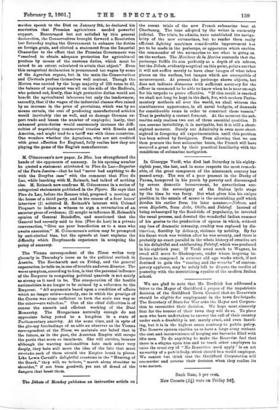In Giuseppe Verdi, who died last Saturday in his eighty-
eighth year, the last, and in some respects the most remark. able, of the great composers of the nineteenth century has passed away. The son of a poor peasant in the Duchy of Parma, hampered in his youth by poverty and discouraged by severe domestic bereavement, he nevertheless suc- ceeded to the sovereignty of the Italian lyric stage by the time he was forty. But what gives him his unique position in the annals of music is the astonishing gulf which divides his earlier from his later manner,—Nabuco, and even Rigoletto, from Aida, Otello, and Falstaff: Instead of being submerged by the flood-tide of popularity, he inverted the usual process, and devoted the wonderful Indian summer of his genius to the production of operas in which, without any loss of dramatic intensity, crudity was replaced by dis- tinction, floridity by delicacy, violence by nobility. By far his finest work was written after he was seventy, and there is probably no exact parallel in the whole history of creative art to his delightful and exhilarating Falstaff which was produced in his eightieth year. If Verdi owed much to Wagner, he awed still more to Shakespeare, under whose inspiring in- fluence he composed in extreme old age works which, if not destined to gain the "roaring and the wreaths" of contem- porary applause, may be safely left to dispute the verdict of posterity with the meretricioup squalor of the modern Italian schooL


































 Previous page
Previous page